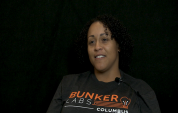5:14 | Deploying to Iraq was a wide-eyed experience for a young Kim Tapia. The older soldiers who had been there before were complaining, something that she can look back on, now, in solidarity. The heat of Kuwait was overwhelming, but she soon moved to a forward operating base in Iraq. (Interview conducted at, and with the assistance of, the National Veterans Memorial and Museum.- https://nationalvmm.org/)
Keywords : Kim Tapia Iraq Forward Operating Base (FOB) Marez

She joined the Army to get help with paying for college, but the brotherhood and sisterhood was so strong and so satisfying that Kim Tapia is still there, 15 years later. (Interview conducted at, and with the assistance of, the National Veterans Memorial and Museum.- https://nationalvmm.org/)
The Drill Instructor was tough but supportive and the training was specific and repetitive. Kim Tapia didn't understand it at the time, but the Army was preparing the trainees for how to react and survive and win in a war fighting environment. (Interview conducted at, and with the assistance of, the National Veterans Memorial and Museum.- https://nationalvmm.org/)
Kim Tapia describes working at night in the tactical operations center, managing and directing support for the convoys traveling through Iraq. It was an important job and she gradually realized just how important. She still hangs on to the DVD's she bought in Iraqi shops to watch in her off hours. (Interview conducted at, and with the assistance of, the National Veterans Memorial and Museum.- https://nationalvmm.org/)
The Iraq war required a huge supply operation to staff and stock the bases scattered around the country. Kim Tapia worked in the tactical operations center at one of these bases, monitoring and managing the patrols on the road. She recalls when a daisy chain IED hit one of the convoys, and the time a vehicle borne device exploded near the front gate. (Interview conducted at, and with the assistance of, the National Veterans Memorial and Museum.- https://nationalvmm.org/)
Kim Tapia was lucky to be assigned quarters in one of the hardened concrete spaces at the base near Mosul. When the base came under mortar fire, she didn't even wake up. She received plenty of training and briefings on what she would face in the war zone, but she feels the support was lacking for soldiers transitioning back home. (Interview conducted at, and with the assistance of, the National Veterans Memorial and Museum.- https://nationalvmm.org/)
It was good training that helped her get through a stressful deployment to Iraq. Kim Tapia worked inside the wire instead of out on the roads, but it was her job to manage and support all those convoys. She remembers the ribbing the support soldiers took from the ones who ventured outside, something that never bothered her. (Interview conducted at, and with the assistance of, the National Veterans Memorial and Museum.- https://nationalvmm.org/)
It was very odd to transition from her tense situation in the war zone of Iraq to the tranquility of the Georgia countryside. The Army had changed Kim Tapia, but it was a good change. It was so good she enthusiastically entered the reserve force for a long run. (Interview conducted at, and with the assistance of, the National Veterans Memorial and Museum.- https://nationalvmm.org/)
Iraq war veteran Kim Tapia describes her work with Bunker Labs, a non-profit that helps veterans become entrepreneurs. Transitioning back to civilian life can be daunting, and she says that communities need to step up with support. (Interview conducted at, and with the assistance of, the National Veterans Memorial and Museum.- https://nationalvmm.org/)